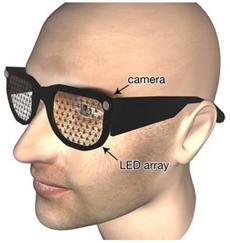Bionic glasses for poor vision
09 Jul 2011
A set of glasses packed with technology normally seen in smartphones and games consoles is the main draw at one of the featured stands at this year's Royal Society Summer Science Exhibition.
 But the exhibit isn't about the latest gadget must-have, it's all about aiding those with poor vision and giving them greater independence.
But the exhibit isn't about the latest gadget must-have, it's all about aiding those with poor vision and giving them greater independence.
"We want to be able to enhance vision in those who've lost it or who have little left or almost none," explains Dr Stephen Hicks of the Department of Clinical Neurology at Oxford University. "The glasses should allow people to be more independent – finding their own directions and signposts, and spotting warning signals," he says.
Technology developed for mobile phones and computer gaming – such as video cameras, position detectors, face recognition and tracking software, and depth sensors – is now readily and cheaply available.
So Oxford researchers have been looking at ways that this technology can be combined into a normal-looking pair of glasses to help those who might have just a small area of vision left, have cloudy or blurry vision, or can't process detailed images. (See: University College of London technology used in windpipe transplant)
The glasses should be appropriate for common types of visual impairment such as age-related macular degeneration and diabetic retinopathy. NHS Choices estimates around 30 per cent of people who are over 75 have early signs of age-related macular degeneration, and about 7 per cent have more advanced forms.


















